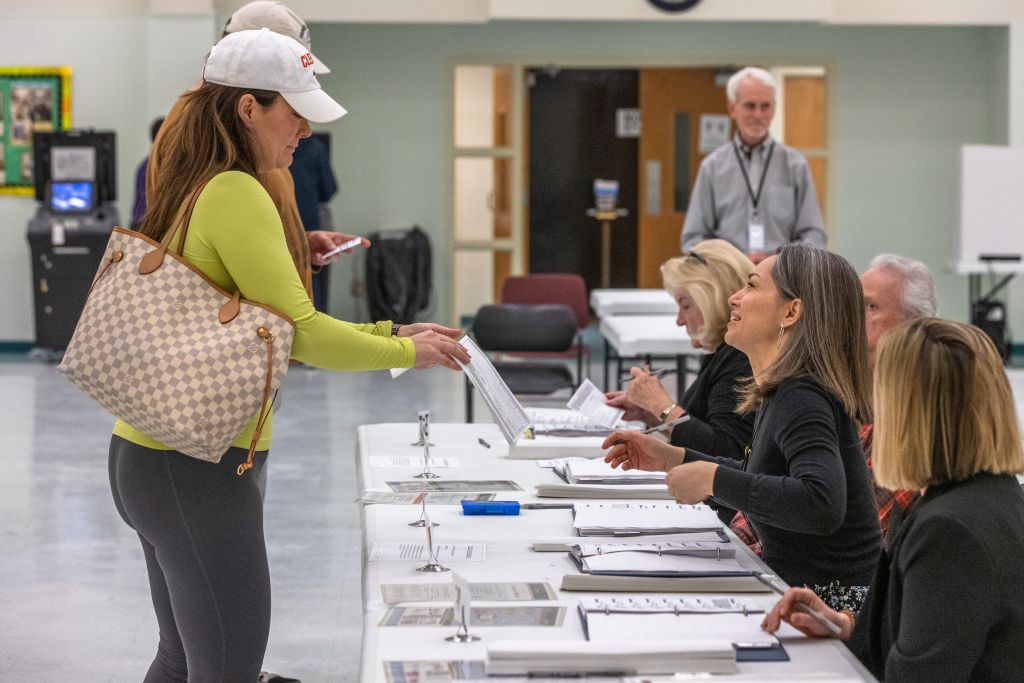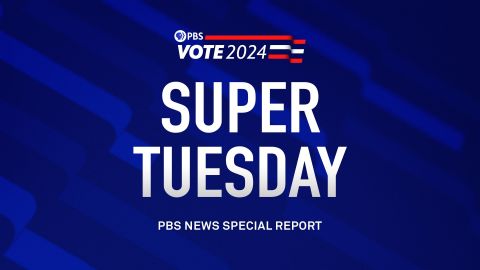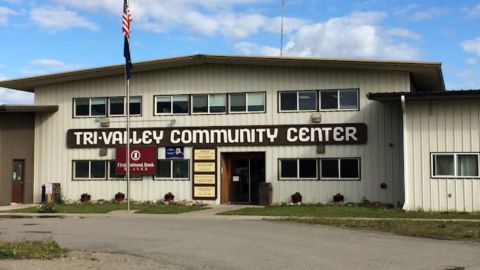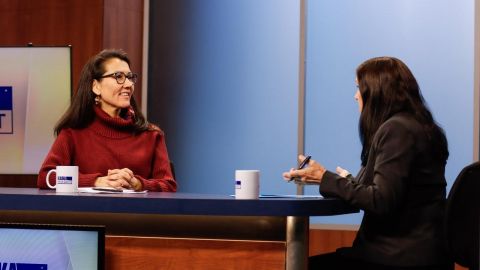Dispatches from Super Tuesday

This piece is a collaboration of PBS member stations across the country including Rocky Mountain PBS, TPT – Twin Cities PBS, Houston Public Media, PBS Utah, KUER, Alaska Public Media, and The WNET Group.
Voters in 16 states and one U.S. territory made their voices heard this week in sweeping primary elections that saw Donald Trump and Joe Biden inching closer to a 2024 rematch.
The Super Tuesday contests took place in Alabama, Alaska, Arkansas, California, Colorado, Maine, Massachusetts, Minnesota, North Carolina, Oklahoma, Tennessee, Texas, Utah, Vermont and Virginia this year, and Iowa and American Samoa will announce limited caucus results as well.
In some states, it could take several days to see final results due to mail-in voting. For example, in California, mail-in ballots needed to be postmarked by March 5 and received by county election offices by March 12, meaning not all votes are tallied on Super Tuesday — especially for races with close margins.
This Super Tuesday was characterized by low voter turnout across the board. According to experts, this is due in part to some voter fatigue over what many see as an inevitable rematch between President Joe Biden and former President Donald Trump.
Nikki Haley dropped out of the race Wednesday, challenging Donald Trump to win over her supporters. Biden gave a speech welcoming Haley’s voters to his campaign, saying Trump was “determined to destroy democracy”; Trump in turn called Biden “the worst president in U.S. history” in an interview on Fox News.
While Super Tuesday results have important implications for the 2024 presidential race, particularly for Republicans, voters will also finalize the selection of candidates for Senate, House, and gubernatorial races coming up in November. The results of down-ticket races will determine the political makeup of Congress, as well as who will govern certain states, for the next two to four years.
Preserving Democracy reached out to PBS reporters in several Super Tuesday states to hear key takeaways from the experts who regularly cover these communities. Here are their findings.
COLORADO
Rocky Mountain PBS’ Managing Editor Gabriela Resto-Montero breaks down Colorado’s Super Tuesday results for Preserving Democracy below:
Her key takeaways: On Monday, the eve of Super Tuesday, the U.S. Supreme Court unanimously ruled that Donald Trump would stay on the Colorado ballot, reversing a previous Colorado ruling that disqualified him from returning to office because of his conduct around the Jan. 6, 2021 attack on the U.S. Capitol. The next day, Republican voters went out and clinched 22 Colorado delegates for Trump, though Nikki Haley scooped up 12 delegates with 33% of the vote.
President Joe Biden swept up all 72 of Colorado Democratic delegates. About 8% of Colorado voters went with the ‘uncommitted’ protest vote; not high enough to count towards any delegates.
For more Colorado coverage, check out Rocky Mountain PBS’s political coverage.
MINNESOTA
Minnesota often leads the nation in voter turnout in general elections. But this Super Tuesday, turnout was on the lighter side despite having a presidential candidate from Minnesota on the ballot: Congressman Dean Phillips.
Following the Super Tuesday results, on Wednesday afternoon, Phillips announced that he would drop out of the 2024 primary election race for president and endorse his Democratic rival, President Joe Biden.
Mary Lahammer, Anchor, Reporter, and Producer at Twin Cities PBS, shares this analysis on Super Tuesday in Minnesota:
Lahammer shares in her analysis:
“Most recently, we had Amy Klobuchar, Tim Pawlenty, Michelle Bachman, Walter Mondale, Hubert Humphrey. They all ran for president from Minnesota. But, Congressman Phillips did not fare well in his home state. He did not win his Congressional District. In fact, he couldn’t break into the double digits. What’s interesting is he finished in 3rd place behind uncommitted, and that’s generating a lot of national attention, where almost 20% of the vote went to that protest against President Biden on the policy in Israel. Biden came in with about 70% of the vote, and former President Trump did about the same.”
Keep an eye on what’s happening in Minnesota state politics and elections at our interactive map.
TEXAS
Houston Public Media’s Andrew Schneider has our Texas analysis. Schneider notes that turnout was down significantly, with just 18% of voters in Texas participating in the primary: about 1 million Democrats and 2.3 million Republicans. Besides the presidential race, several other important contests were decided in Texas. Take a listen:
UTAH
Ahead of Super Tuesday in Utah, KUER and PBS Utah sat down with six Utah Republicans to discuss what they think of the 2024 presidential race candidates and explore some of the key topics that are important to them during this campaign cycle: the border, abortion, and fiscal responsibility, to name a few.
The prospective voters also share what they think it means to be a Republican in 2024. Take a look:
Follow Utah state politics and election coverage at our interactive map.
ALASKA
Alaska Republicans had their primary election this Super Tuesday, sending Donald Trump through to the win with 88% of the vote. Alaska Democrats won’t have their election until April.
“The party won’t finalize the numbers until next week, but if preliminary results hold, Trump has won all 29 of the delegates Alaska will send to the national convention this summer,” Alaska Public Media’s Liz Ruskin writes. As of writing, “Haley has apparently fallen short of the 13% she needed to win any Alaska delegates.”
About 10,500 Republican voters cast ballots across much of Alaska yesterday. According to Alaska Public Media, there was some confusion when it came to voters finding their polling places and the location hours. Many voters tried to vote in the morning before work, not knowing polling places were only open from 3PM – 8PM.
“People have been trying to vote all day,” Mike Robbins, supervisor at the Grace Church voting site and vice chair of the Alaska Republican Party, told Alaska Public Media. “They’ve been going to polling places around the city since about 8 o’clock this morning,” he said.
For more in-depth coverage, check out Alaska Public Media’s political coverage here.
CALIFORNIA
The Associated Press has called the Democratic primary for Biden, and the Republican primary for Trump. California, the most populous state in the country, has the most presidential delegates up for grabs of any state.
But voters were also deciding on a slew of other races, including Congressional seats, propositions, and down-ticket contests.
Democratic Rep. Adam Schiff of Los Angeles, who led the first impeachment inquiry of former President Donald Trump, will face Republican Steve Garvey in a general election runoff to decide who will represent California in the U.S. Senate, according to reporting by KPBS’ Marisa Lagos.
California voters were split in early returns over Proposition 1, a statewide ballot measure promoted by Governor Gavin Newsom as a necessary step in tackling the state’s ongoing homelessness crisis. Prop. 1 would be the first major update to the state’s mental health system in 20 years. As of publishing, Proposition No. 1 had not yet been decided; we’ll update with results when they come in.
For more California Super Tuesday coverage, check out KPBS in San Diego for political news.
MORE TO COME
Though Super Tuesday holds an increasingly important place in the presidential race, the primaries are by no means over. State primaries will run through the summer, with candidates collecting delegates along the way. Official nominations won’t take place until July for Republicans and August for Democrats, when the parties’ official conventions are held.
Thanks to our station partners for their contributions to this special Super Tuesday recap. For more state-by-state coverage, check out our interactive map.



